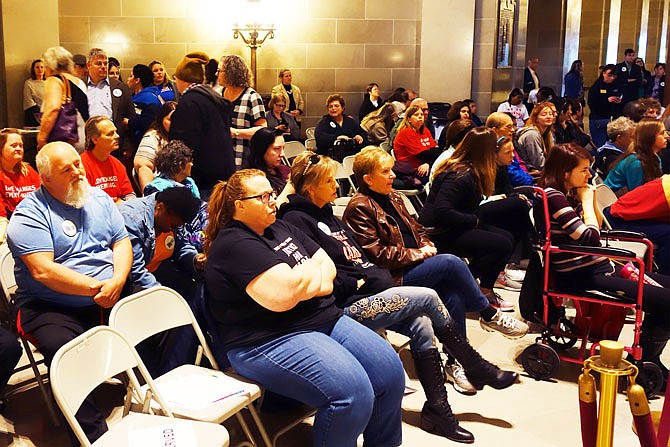JEFFERSON CITY, Mo. - The chant echoed clear to the top of the Capitol building's dome.
"Who are we here to honor?"
"Carl!"
During a rally last week in Jefferson City, disability rights activists took time to remember Carl DeBrodie.
The developmentally disabled, 31-year-old man was reported missing from a Second Chance Homes facility in April in Fulton and was found dead shortly later.
"He was encased in concrete," event emcee Chris Worth said. "That's not right, right? Nobody deserves that, right?"
He called upon authorities to file charges in DeBrodie's case, and asked attendees to remember DeBrodie while talking to state representatives about disability rights issues.
"We're going to carry Carl's spirit forward," Worth said. "We're going to keep him alive. We must not let this happen again."
DeBrodie's aunt, Carol Samson, and former legal guardian, Mary Martin, attended the 17th annual Disability Rights Legislative Day. After the rally, as activists dispersed to talk to their state senators and representatives, Martin said Worth's words had touched her.
On Wednesday, she wore a hoodie printed with "Justice for Carl" and a pair of dates: his birthday and the day police found his body. While she wasn't familiar with the details of of the disability rights day's talking points, she said changes must be made.
"My lawyer wants to get the law on adoption changed," she said. "I couldn't adopt Carl because he wasn't blood."
She and Samson said they couldn't comment in-depth on the lawsuit filed Jan. 23 by Samson and DeBrodie's biological mother.
"It's going," Samson said. "It's going to be a long process."
She contacted event organizers after seeing a flier about the rally. She supports changes to guardianship laws and also hopes to see reforms in oversight of homes like the one where DeBrodie lived.
"I think people need to be able to go into these homes and check on their loved ones," she said.
DeBrodie's family has previously said Second Chance Homes prevented them from visiting DeBrodie.
Seeking change
Many speakers at the rally were passionate about how proposed legislation could change their lives or their loved ones' lives for the better.
Some are advocating for changes to the Ticket to Work Health Assurance Program and the Consumer Directed Services program. Both help provide support for individuals with disabilities so they can live and work as independently as possible.
Currently, only about 33 percent of working-age Missourians with disabilities are employed, according to materials handed out at the rally. However, 80 percent of unemployed, working-aged people with disabilities want a paying job, according to a 2011 study.
"Work is respect," said Steven Foelsch, an adjunct history professor and activist. "Work is camaraderie. Work is reciprocity. Work is contributing to your community."
A motorcycle accident in the 1990s resulted in Foelsch being partially paralyzed. In order to do the work he loves, Foelsch needs some assistance in the mornings and evenings.
Glen Stilley, a young man wearing a snazzy purple bow tie, also spoke in support of expanding services that help people with disabilities find and keep jobs. He volunteers extensively and also works as a greeter at Union Station in Kansas City, where he lives. He's aided by a job coach.
"Let's keep the money going," he said.
Missouri offers the Ticket to Work program to help people with disabilities access personal care services, but eligibility is restricted. As it currently stands, only people with low income may access the program - meaning some people pass up on career advancements in order to keep the service.
Senate Bill 699 and House Bill 1527 would change eligibility requirements, eliminating the net income limit. They would also exempt up to $50,000 of a spouse's income when determining eligibility.
"Individuals with disabilities should not be forced not to marry just to get in-home care," Sen. Scott Sifton, D-Affton, said.
Consumer Directed Services allows people with disabilities to hire and train personal care attendants. Budget cuts last year led to a 40 percent reduction in the availability of CDS.
Tammy Teel relies on CDS to help her go to bed, bathe and perform other essential daily tasks. While she used to be able to make her own schedule, the cuts to CDS mean she can't get assistance when she wants it.
"I've had to become a completely different person now that my independent life is over," she said.
Her meals and bedtime are now determined by assistants' limited availability.
"It sounds like a prisoner's life to me," she said during the rally.

